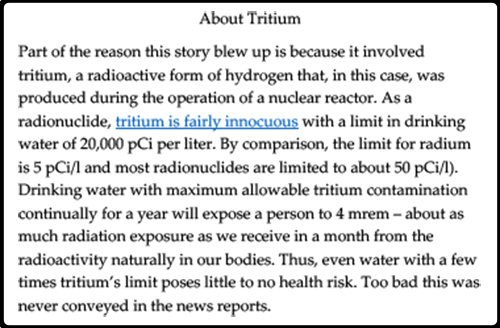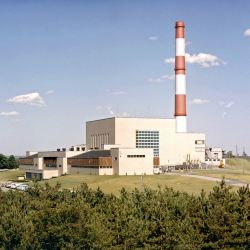It probably won’t shock you that there’s a general perception that radiation is unusually dangerous. Even the slightest exposure can cause cancer, congenital disabilities, constipation, skin burns, bad breath, and death (well…most of these, anyhow)… so the public is scared of radiation. So it’s hardly surprising that the discovery of tritium (a radioactive form of hydrogen) in groundwater near the Brookhaven National Laboratory kindled months of media coverage
Reporters know this – they know that stories about radiation will sell, so they’re always happy to run a story on the subject. Politicians know about this too – it’s easy for them to score points with their constituents by making grand pronouncements, condemning whoever they feel screwed up, and general grandstanding. And, since neither politicians, reporters, nor members of the public know very much about radiation and the underlying science, the fact that these fears are largely unwarranted goes unrecognized.
The discovery of tritium near the well-known home of Nobel laureates, Brookhaven National Laboratory, sparked a flurry of studies – public health, environmental impact, groundwater sampling, and more – that continued for over a decade.
I was a graduate student when all of this was taking place, studying (among other things) hydrogeology while working in radiation safety. Although I was too busy to keep up with the news regularly, I was vaguely aware of the story. While the news stories didn’t include much actual information about the tritium, I knew enough to realize it was highly unlikely to pose a risk to anyone. So, I was surprised that the story, like the Energizer bunny, just kept going and going. I got wrapped up in finishing my thesis and lost track. When I learned about the recently published, The Leak, I decided it was time to find out what happened next.
 There’s not enough room here to go into all the details about what happened at Brookhaven – it took the authors almost 300 pages to tell the story. After reading so many books that amounted to extended anti-nuclear or anti-radiation screeds, it’s refreshing to read a book about a radiological matter in which the author(s) actually get the science right and are not trying to score points in favor of their particular cause. It’s a book grounded in actual science.
There’s not enough room here to go into all the details about what happened at Brookhaven – it took the authors almost 300 pages to tell the story. After reading so many books that amounted to extended anti-nuclear or anti-radiation screeds, it’s refreshing to read a book about a radiological matter in which the author(s) actually get the science right and are not trying to score points in favor of their particular cause. It’s a book grounded in actual science.
For this review, let it suffice to say that the two authors, one is a seasoned reporter, and the other is a veteran scientist who devoted over four decades of his life to Brookhaven; they did a great job of explaining not only the basic science behind the tritium leak and its spread through the local groundwater, but also the reason that the story took hold in the media, with politicians, and with the public. And all for what turned out to be a fairly small amount of tritium that exposed nobody to a significant radiation dose.
If you were, as I was, peripherally aware of this story as it was breaking – or if you simply want to learn more about radiation and its impact upon public discourse – I recommend this book. It’s not perfect, but far better than most involving radiation or radioactivity.
The Leak: Politics, Activists, and the Loss of Trust at Brookhaven National Laboratory.
Robert P. Crease, with Peter D. Bond
MIT Press, 2022

